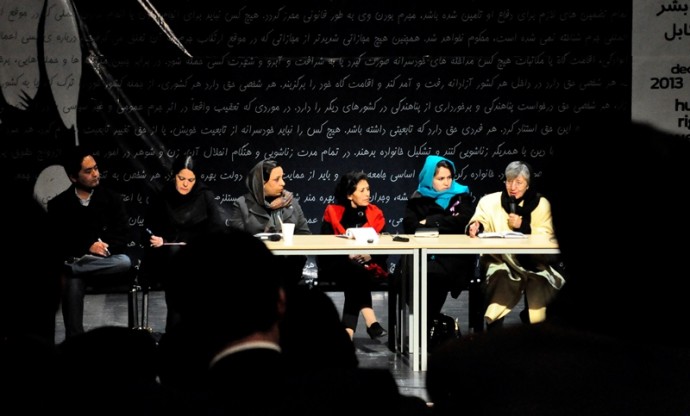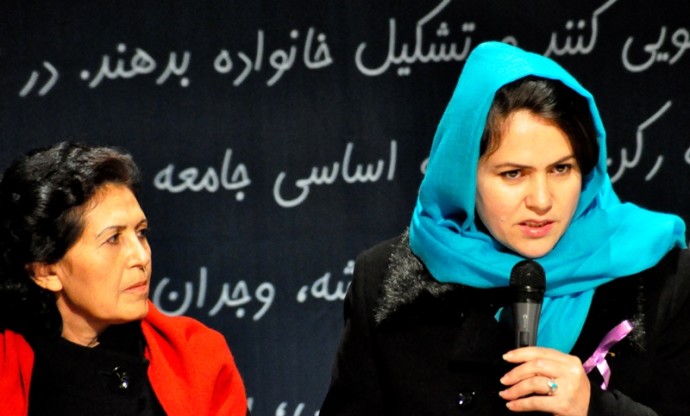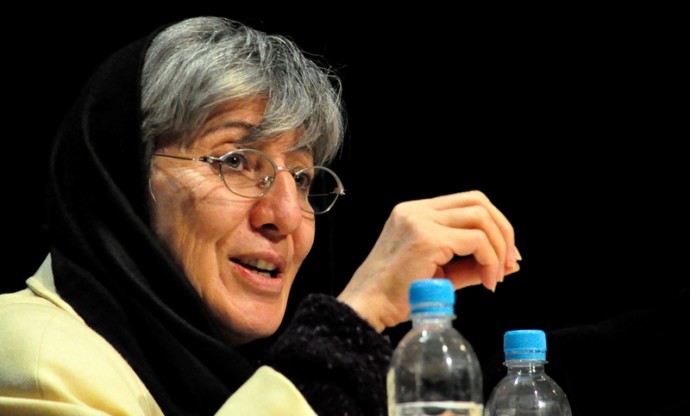On 8 December 2013, on the second day of Celebration Week of Human Rights day (7-11 Dec 2013), Armanshahr Foundation and the Institut français d’Afghanistan (IFA) in Kabul jointly held a round table entitled “Women’s political participation and the preservation of achievements”.
The panel brought together Parliamentarian Fawzia Koofi, Head of Committee of Women, Civil society and Human rights, Dr. Sima Samar, Head of Afghanistan Independent Human Rights Commission- AIHRC), Dr. Alema, Founder of Women’s Political Participation Committee, Roya Sadat, Co-founder of the 1st International Women’s Film Festival-Herat and Heather Barr, Human Rights Watch Afghanistan researcher. Zia Moballegh, Specialist in Human rights and Islamic studies, chaired the round table. An enthusiastic public of scholars, writers, activists, civil society representatives and students attended the Round table.

Firstly, General Hekmat Shahi, head of Gender Affairs of the Ministry of Interior affairs spoke on women’s status and position within the police force, national army and challenges they are facing in all branches of power, particularly in the Judiciary. Ms. Hekmat Shahi spoke of her concerns about violence against women, which, according to her, has penetrated and is institutionalized in all political, social, economic, and cultural structures and spheres.
Mr. Zia Moballegh, who chaired the round table, said; “today we are gathered to address the issue of women’s political participation and preserving achievements from the perspective of those who are directly involved in gender and women’s welfare. This will provide us with new insights in addressing challenges women are facing”. He asked Dr. Sima Samar, Head of AIHRC, to elaborate on women’s organizations and their impact on women’s lives.
Dr. Samar, while referring to the Taliban regime, said: “let us not forget that in the twentieth century we were the only state in the world to officially deprive half of the population from the right to education. Therefore, the greatest achievement of the post-Taliban decade is the emergence of a new State system in Afghanistan. Currently over three million girls are attending schools and universities, which is in itself a great achievement”.
The Chairman asked Ms. Fawzia Koofi to address the issue of women’s quota in the Afghan parliament. Koofi said: “Afghanistan is not the only country where women’s share in politics is proportionated. The same system applies for our neighboring countries, but the difference is that in our neighboring countries in addition to the proportional representation of women in politics, women can freely and directly participate in electoral campaigns. But unfortunately, outside the governmental 25% quota of seats for women in parliament, there is no law in Afghanistan supportive of women’s free competition for a political seat. However, one should not forget that ranking women’s participation in the legislative branch of power worldwide, Afghanistan finds itself on the 22nd place. Of course, there are still flaws in the electoral law that should be addressed including the one related to the quota for women. We have brought this issue up in the Parliament, but because of the misogynist attitude of some MP’s this issue has remained unsolved. But men are not the only issue. For example, an important reason why the Law on Elimination of Violence Against Women (EVAW) did not pass was the lack of consensus between the female MP’s. Luckily, this failure caused a better coordination, cooperation, and solidarity between female MP’s. They see Women rights and civil liberties as their own now. I consider this as a positive development”.
Referring to women’s participation in the Persian Gulf and North African countries, Mr. Moballegh mentioned two ways in which women have organized themselves, either through social movements and grass-roots groups or institutional organizations NGOs. Consequently, he asked Dr. Alema to elaborate on the way women in Afghanistan have organized themselves and to discuss the role of governmental agencies and institutions on women’s political participation.
Based on her work experience of the last decade, Dr. Alema said: “due to the unfortunate fact that activities are project-based and temporal, no structural progress has been made on women’s rights and well-being. We did not allow for core feminine politico-social movements to shape. The NGO’s, at the cost of their original objectives, are in competition with each other to make as much money as possible. The NGO’s are rarely connected with rural communities. And their activities cease to exist as soon as one leaves the city centers. Therefore, we are simply not in touch with a vast majority of people in the countryside. Hence, we should reflect upon our activities, evaluate our programs, and ask ourselves what have we really achieved on women rights issues in more than a decade?”
Mr. Moballegh, asked Ms. Roya Sadat to speak of women’s participation in the field of Arts and cinema. Ms. Sadat said; “the question is what we mean by progress. For example in 2002 there were few female actresses and not a single female director and now there are many in both fields. However if we measure progress in terms of professional and personal security of women within these fields; unfortunately, little progress has been made. Women are under a variety of pressures. Even at this, very moment I speak to you, Arts in general and cinema in particular do not enjoy any governmental support. Even the Ministry of Information and Culture has not paid the slightest attention to these issues. Cinema is not seen as legitimate form of art. And the role cinema can play in directing and shaping public opinion is widely underestimated.”
She further added: “as to the subject of women’s political participation, in almost all domains, women have a merely symbolic role. They have little authority in shaping political processes and making important political decisions. In addition to this, women of Afghanistan suffer from bipolar identity. There is a wide gap and lack of exchange between the urban and rural women. Hence, we as city-dwellers should consider different approaches in reaching out. We live in a patriarchal and at the same time misogynist society. In other words, men are not the only oppressors, women themselves too play an important role in violence against and oppression of women”.
Ms. Heather Barr of Human Rights Watch was the last speaker of the panel. She spoke on the upcoming elections and women’s participation as a political force. She said: “I think that Human Rights were not an essential part of previous elections, but the upcoming election must be different. We should focus on guiding the campaigns of presidential candidates towards Human Rights’ issues. I think that media and civil society could play a crucial role in this. For example, media acrors could easily ask the candidates if they are willing to publish Human Rights reports of war crimes of the last three decades, or, if they are willing to enact and implement the law on EVAW, both in urban and rural areas nationally. Women are facing big challenges in the upcoming elections. Hence they should elect their preferred candidate carefully. Women should not wait for political power to be delegated to them. They should learn to acquire it”.



